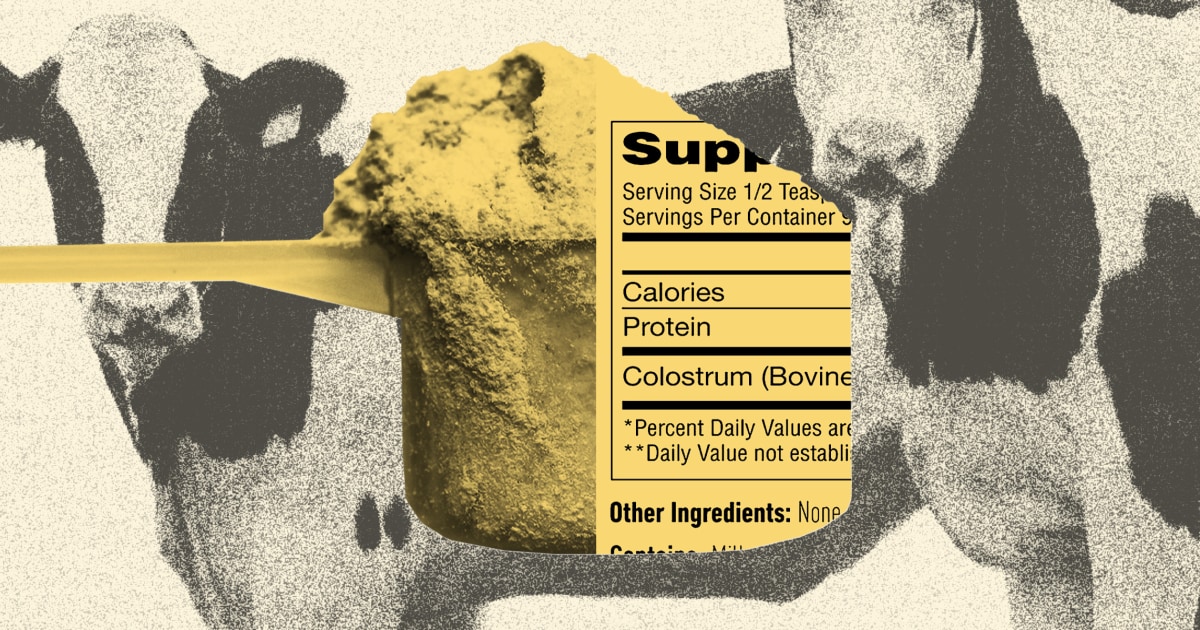Should you add colostrum to your daily diet?
On social media, influencers add scoops of the powder to drinks. On podcasts, ads for the supplement tout it for a number of benefits: better immunity, improved gut health, weight loss, exercise recovery.
“Colostrum has been one of the highest interest supplements over the past year,” a spokesperson for GNC wrote in an email. In GNC’s upcoming “Anti Trend Report,” colostrum supplements were highlighted as one of the biggest supplement trends of the year.
Sometimes referred to as “liquid gold” because of its honeylike appearance, or the “starter kit” for infants, colostrum is a crucial part of newborns’ development.
But what about adults? And what if that colostrum comes from a cow, not a human?
Here’s everything you need to know about colostrum supplements, and if they’re worth it.
What is colostrum?
Colostrum is an early form of breast milk that’s produced right after giving birth.
It’s meant to support newborns’ development and contains essential nutrients to kick-start their immune system, support their gastrointestinal system and aid their overall growth.
Compared to so-called mature milk, the kind of milk produced after colostrum, colostrum is higher in protein, fat, vitamins, minerals and peptides. It’s produced for about five days after birth.
Dr. Pieter Cohen, an associate professor at Harvard Medical School and a general internist at Cambridge Health Alliance, said colostrum contains certain antibodies and compounds that are important for infant development.
“Colostrum contains a lot of things that are good for babies of the given species,” he said. “Human babies will be exposed to things that can help, like immunoglobulins and other immune-boosting proteins in the colostrum. They’re really good as the babies are developing their own immune system.”
Other studies have demonstrated colostrum’s importance for infants in gut microbiome formation and reducing allergy risk.
Colostrum supplements aren’t made of human breast milk, however. The majority are made from cow’s milk and sold as bovine colostrum. Some colostrum supplements are made from goat’s milk.
Why do people take colostrum and what does the research say?
There’s a lot of interest in colostrum for help with inflammation, particularly in athletes, said Daniel Fabricant, president and CEO of the Natural Products Association, a supplement industry trade group. He also cited gut health as a benefit.
(Fabricant added that colostrum supplements aren’t meant to cure, treat or mitigate disease. “It’s always important to differentiate something that is a health and wellness product versus something that is curing, treating, mitigating disease,” he said.)
In a review paper published last year in the journal Frontiers in Immunology, researchers said that many studies reported positive effects for athletes taking the supplement — including supporting muscle recovery, boosting immunity after intense exercise and healing from injuries — though they added that more research is needed. The review was funded by a dairy company.
Another review saw improvements with gastrointestinal issues like diarrhea. The authors, however, wrote that there was “limited evidence” on colostrum’s effects on gut health, “with mixed findings.”
Wesley McWhorter, a registered dietitian and spokesperson for the Academy of Nutrition and Dietetics, said the research on colostrum supplementation is too early to make bold claims.
“Most of this research, still very preliminary, it’s early. There’s not large-scale studies, so there’s no strong evidence,” McWhorter said. Still, he said he’s interested in seeing where the research goes.
In many cases, studies are funded by companies that sell colostrum.
Richard Bloomer, dean of the College of Health Sciences and director of the Center for Nutraceutical and Dietary Supplement Research at the University of Memphis, said that each study’s factors — the supplement’s source, its dosage and who the subjects were — vary, which can affect results.
Cohen said he doesn’t believe the research is extensive enough yet, and he doesn’t recommend colostrum supplements.
He added supplements can vary by each manufacturer and brand, and quality assurance is lacking.
“So even if it were that there was one or two studies on a specific product, it doesn’t mean that that product today is made the same way that the one that was studied,” he said.
Can you get the same benefits without colostrum?
The research on colostrum seems more promising for athletes, who have their sleep, diet and exercise “dialed in,” McWhorter said. But for the average person, he said, there are other ways to achieve the same benefits.
McWhorter recommended a “food first” approach.
“Focus on your diet first, your exercise second and dial in on the other pieces,” he said. “And that’s really where you should spend your time, instead of on supplements. There is no magic pill right now.”
Benefits like the ones promised by colostrum can be achieved through lifestyle changes, such as diet, exercise and regular sleep.
Bloomer said consumers should evaluate what they’re willing to spend their money on.
“Could you justify an extra $2, $3, $5 a day to get a little bit of potential benefit? You might be better served by spending those $5 on a bunch of fruit and vegetables and try to enhance your immune function that way,” he said.
